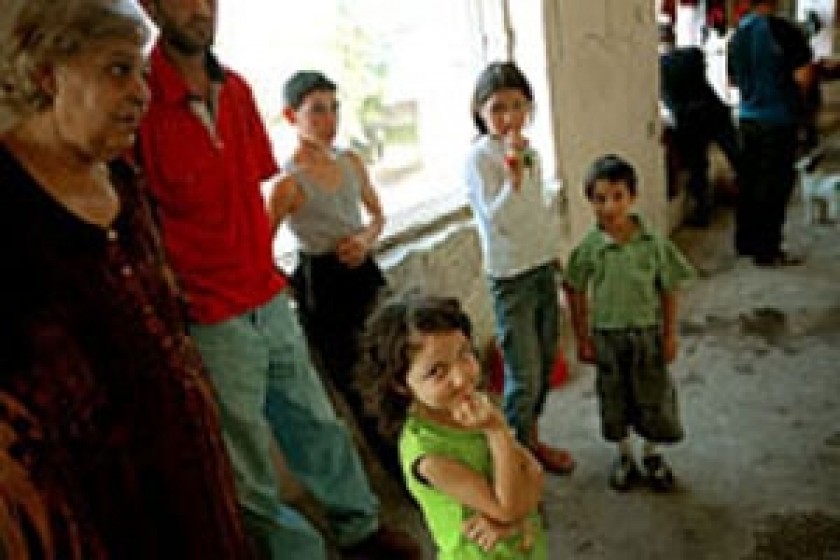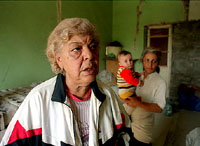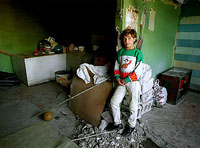
When your child says, "I want some bread"
About a year ago homeless families began to settle in a former art school on Artsakh Street in Yerevan (See also: "We are people too"). Today there are forty-five families-one hundred and sixty people-living in the ramshackle building. Until recently it was considered ownerless; a month ago the building was transferred by a government decision to the Shengavit district administration. It is not clear yet what the district will do with the people who live here. "It's a hard question. They are mainly needy families. First we have to take inventory to find out what we have there. Then there should be an individual approach to each particular case. We now know that there are people who have other apartments, too; they saw vacant rooms and settled there," said Hamlet Hakobyan, the deputy district mayor of Shengavit.
Given what we learned when we met with building residents-poor, jobless, socially unprotected-his seems a fairly rosy view.
Susanna Boyadjyan is renovating what used to be the second floor bathroom of the old art school. She sells old clothes at the flea market near the railroad station. "My son went to fight as a volunteer; twenty-two days later he was wounded in the back and arm, and crippled. It was 1992. Nobody knew what was going on here; I had no idea who to go to. I took my son to Russia - to Tuapse. There was a cosmonauts' doctor named Victor on vacation in Tuapse who cured my son. Or he put him on his feet. He was 204 centimeters tall, and now he's 184 centimeters because his back is doubled up. His vertebrae healed wrong; we were supposed to take him back in a year to unbend his bones, but we didn't have any money and he remained crippled. When we came to Yerevan , we got into more trouble-my son became close to a prostitute. That girl told the police that my son had stolen stuff worth $3,000 from a neighbor. They convicted him and confiscated our apartment. My son spent a year and eight months in jail. A month after the trial the girl, Kristine Petrosyan, was arrested for murder and sentenced to twelve years in prison. Then our apartment was put up for auction."
The one-room apartment was sold by the Service of Obligatory Execution of Writs for $1,200. We should point out that the market price of similar apartments in 2000 was at least $5,000. But the way this agency works is that they put an apartment up for auction several times, each time claiming that it can't not be sold, and each time lowering the initial price by 20%. Finally, they sell it to an acquaintance and take a commission-but that's a different subject.
 |
 |
"My son is disabled, he's married with a seven-month-old son, and he's unemployed. I take care of his family. The doctor says that the time will come that he will be able to walk. My son is all I have. My husband was a boxer-he died and we were left alone. My son was two years and eight months old when my husband died. We haven't really had a home since 2000. I'm a commodity researcher by training. I used to work as a chef-I had good jobs," Susanna continued.
Susanna's son doesn't receive a disability pension, even though he is disabled, because he doesn't have any documents proving that he participated in military operations. "I went to a couple of places; no one paid any attention to me, " Susanna explained. "The residents of this building need somebody to help them. I feel sorry for the kids; they may end up being homeless. At least they could have let us privatize our rooms and get registered here, in order for us to become independent. If rich people just grab hectares of land from our homeland, at least let us have this. I have worked for twenty-five years and now I deserve this bathroom."
Susanna Boyadjyan is a pensioner who receives 4,300 drams a month. But neither she nor her son is registered here.
There are women in the building on Artsakh Street , Susanna told us, who receive men in their rooms to earn money.
"I don't blame these girls; they have children. There was a girl from Artashat - beautiful, like she'd been drawn with a pencil. Her husband went to jail; how was she supposed to take care of her child? What could she do? I don't blame her. There are some others who are brazen, this is the way they live, but there are those who have chosen this life because of hardships. Do you know how painful it is when your child says, 'I want some bread?' Not 'I want meat, grapes, peaches,' but 'I want bread'?" Susanna asked, with tears in her eyes.
"There is a skinny girl with three children in the last room on the second floor. Once I visited her, she said, 'Have a seat, I'll make you some coffee.' I knew their situation, and I didn't want to be a burden. I said. "No, I don't want any coffee." She said she wanted to have coffee- 'Let's have it together.' Then she saw there was no sugar and said, 'Oh, dear! The kids have eaten the sugar.' It gave me the shivers; I imagined my grandson that hungry. All the people here are miserable, and if you can, just alleviate their troubles a bit," Susanna Boyadjyan concluded.
Photos by Onnik Krikorian
 Videos
Videos Photos
Photos
Write a comment